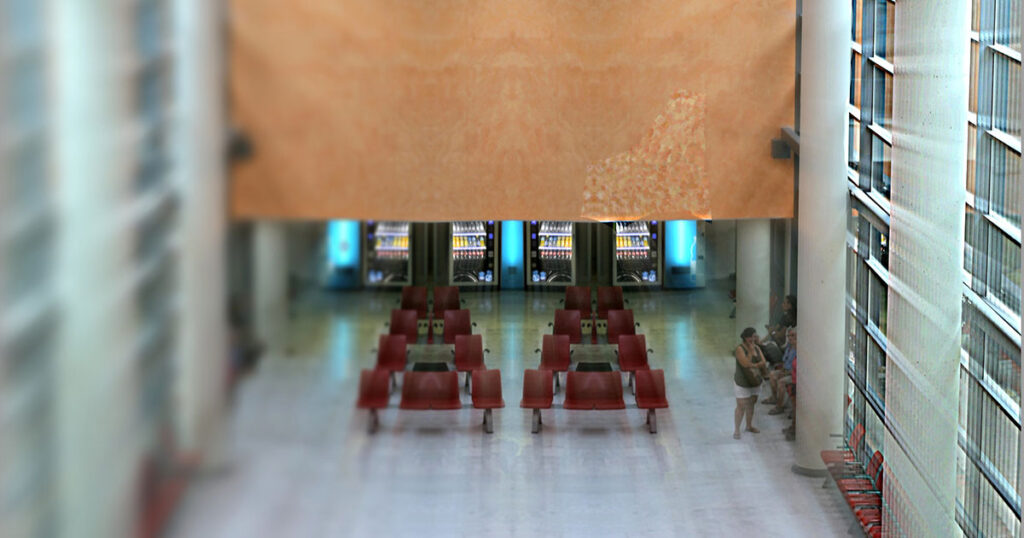
I arrived at the health clinic five minutes before my appointment and, mask in place, took a seat upstairs in the waiting hall. Off the main hall are a dozen doors to different doctors’ offices, with the upper two feet of the dividing wall made of glass. I occupied myself guessing at how many doctors were at work that morning based on the lights that I could see within the offices. Four. I counted the seats, some in the middle, as in an auditorium, and some like mine against the outer wall, opposite the office doors. Exactly 56. A dozen or so people were waiting, among them a man with a red face who appeared to be in his late 40s or early 50s. He was alone, but soon a woman arrived who was apparently a friend, and she went over to say hello and sit beside him. He seemed happy to see her. I went back to my article about abortion in Texas after the heartbeat law, and didn’t think about the minutes ticking by until a patient left one of the other offices and from within, a name was called out, whereupon the woman chatting with the red-faced man stood up and said a hurried goodbye before entering her doctor’s office.
Occasionally someone rose to enter one of the offices, or left the hall by the stairs after emerging from an office, or came up those stairs or on the elevator to join the rest of us waiting our turn. Nobody entered or exited my doctor’s door. Just when I was wondering if my doctor was even at work, a patient left and seconds later my doctor called the next one. It was the red-faced man. For 15 minutes, they were in her office before the door opened and she ushered him out, instructing him to sit and wait. Back in she went without calling the next patient. Another 10 minutes passed before she came out and spoke to the man, who had been growing more and more agitated as he waited, bending forward, burying his face in his hands, leaning back, grimacing, and turning it seemed even ruddier.
I heard a few words and gathered that the man was being sent by ambulance to the central hospital of Asturias, 20 minutes away. The ambulance would arrive soon, and the doctor would accompany him in the ambulance. She returned to her office saying as she did to no one in particular that if she had time she would see the next patient, but only if the patient didn’t dawdle. A woman got up, looked at her watch, and left. Then the doctor called my name.
“Be quick about it,” the doctor practically told me. She was looking at her computer screen, not at me.
“It’s for the results of the blood test,” I said, and after we straightened up the confusion about who I was—she’d called my name, then another patient’s name right on top of mine, but only I had gone to the door—I heard her tell me everything was fine and in the same breath answer the question of a hovering nurse with a bag over her shoulder about supplies to take in the ambulance. The doctor printed out the results of my blood work and then seemed to forget me. I left. Out in the hall, I walked past the red-faced man. I felt like putting a hand on his shoulder. What would I say? “You’ll be fine,” or “Good luck,” or “Every day is a struggle, isn’t it?” I wondered why he’d had an appointment with the doctor instead of going straight to the emergency service to be assessed. Had he not known the condition he was in, or had he rapidly deteriorated since requesting his appointment? Perhaps I could have told him, Hokahey, “Today is a good day to die,” as Crazy Horse is reputed to have said to his warriors, urging them into battle. But this man didn’t look like he was having a good day at all. He wasn’t leaping to do battle but being dragged away from the fray, already down. Besides, I’ve just learned, Hokahey means something more like “Let’s go!” A rousing call.
Thinking about the man later, I wondered why I hadn’t discreetly taken a seat and waited around to see if he walked out or whether a wheelchair was brought for him. Would the doctor be as laconic with him as I found her to be with me? Would she put a comforting hand on his shoulder? But I didn’t think of staying. I was too full of my good luck and clean bill of health. Today was a good day to live. “Let’s go!” I practically skipped down the stairs and out into the street, out into the fray, where I pulled the mask from my face, ready again for the day.

